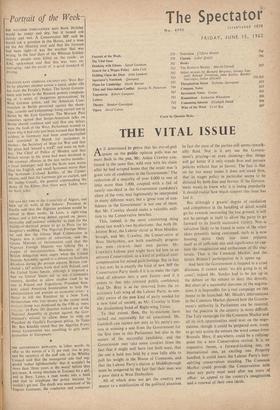—Portrait of the Week— THE WEATHER FORECASTERS SAID Bank Holiday
would be sunny and dry, but it turned out cloudy and wet. A Conservative MP said he would ask a question in the House, and a man on the Air Ministry roof said that the forecast had been right—it was the weather that was wrong. In the four days of the Whitson holiday sixty-six people were killed on the roads:, an RAC spokesman said that this was 'very en- couraging,' and the result of 'a good standard of driving.
FOURTEEN EAST GERMANS ESCAPED into West Ber- lin by pleasure steamer across a canal, under rifle tire from the People's Police. The Soviet Govern- ment sent notes to the Western powers complain- ing of 'a series of dangerous provocations' by West German police, and the American Com- mandant in Berlin protested against the shoot- ings, assaults and kidnappings being carried out in Berlin by the East Germans. The Warsaw Pact countries agreed that Soviet-American talks on Berlin' should continue and said that any delays were the fault of the West. Parliament wanted to know why it had only just been learned that British soldiers in Germany had been court-martialled and convicted in March for incitement to mutiny : the Secretary of State for War said that the press had 'missed a trice,' and went on holi- day. The Chief of Police of Minden said that British troops in his town had been involved in 146 criminal offences in the last twelve months: a local innkeeper said that the Scots were worse than the English, and small Scotsmen worse than big Scotsmen. Colonel Kettles, of the Camer- onians, said that the Germans got so excited, and Sir James Cassels, the general commanding the Army of the Rhine, that there were Teddy boys on both sides.
it
1I1E OAS SET FIRE to the University of Algiers, and blew up oil wells in the Sahara: President de Gaulle said that the Algerian problem would be solved in three weeks. In Laos, a right-wing prince and a left-wing prince agreed on 'peace, neutrality and' national solidarity' in time for the middle-of-the-road prince to go to Paris for his daughter's wedding. The Nigerian Foreign Minis- ter said that the Ghana High Commission in Nigeria was a centre- of subversion, and the Ghana Minister. of Information said that the Nigerian Foreign Minister was talking like a puppet of neo-colonialists. Members of the British delegation were angry when 'the United Nations Assembly agreed to a debate on Southern Rhodesia during the preSent session. Britain con- cluded a £67 million trade deal with Poland, and the United States Sonate, although it imposed a ban on United States aid to any ComMunist country, decided to allow surplus food to be sent to Poland and Yugoslavia. President Ken- nedy asked American businessmen to help the administration and prevent an economic crisis : a threat to kill the President by a New York businessman who lost money in the recent stock market slump was dismissed by the FBI as 'mere roth.ne. In Paris 280 deputies walked out of the National Assembly in protest against the Gov- ernment's refusal to allow them to vote on President de Gaulle's European policy. In Tunis Mr. Ben Khedda stated that the Algerian Provi7 sional Government was unwilling to give more guarantees to Europeans.
THE GOVERNMENT REPEATED, in 'other words, its offer to the nurses of a 24 per cent. rise in pay, and the secretary of the staff side of the Whitley Council said that the managerial side had sug- gested 'rather lightheartedly' that it wouldn't be more than 'three years at the worst' before they got more. A stamp machine in Toronto bit a girl, and in Bury, Lanes, a man broke into a bank and had to telephone the police because he couldn't get out. The death was announced of Sir Eugene Goossens, the conductor and composer.


































 Previous page
Previous page